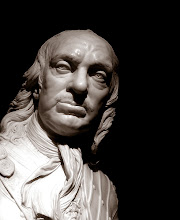"Down prejudice, and patriot for shame!"
 One of my favorite Civil War images: a fanciful newspaper woodcut of U.S. Colored Troops fighting rebels and their bloodhounds.
One of my favorite Civil War images: a fanciful newspaper woodcut of U.S. Colored Troops fighting rebels and their bloodhounds.In 1863 a small book was published in New York. Palmetto Pictures featured the collected poems of Volney Hickox, a 27-year old Union Army staff officer in the occupied south. It's dedicated "To My Class, '57, at Yale, This Year Assembling" and he probably intended to impress his college buddies (a six-year reunion sounds a bit unusual to me, especially during wartime, but Ivy Leaguers are often a world apart).
Volney was my great-great-great grandfather George's cousin, although the two probably never met; Volney's father had left upstate New York (where Volney was born in 1835) for up-and-coming Illinois. As a lawyer in Springfield, Volney came to know Abraham Lincoln, who wrote a letter recommending him for graduate studies at Yale. Volney's poetic efforts failed to make a big splash, but he did go on to have journalistic adventures in New Orleans and Mexico.
A statement on emancipation and Confederate sympathizers from Palmetto Pictures:
Next heard that watchword spoken from the heart
Of contest--"Arm the blacks"--an echo start
Quick at whose sound, the country leaps to aid,
Brigade exceeding everywhere brigade.
Nay, still the negro's right to equal place
Obstructed as of an inferior race
Thwarted and cheated in his humblest claims,
In vain to talk to him of higher aims
For thirty days, lo here, the armed patrol
With drums parade a culprit with this scroll--
Read.--"This man has been mean enough to
steal
A negro's pittance"--notable appeal!
Down prejudice, and patriot for shame!
Is freedom Justice or an empty name?
Again--a ship from Ancient Augustine,
With parasitic spitfires, full of spleen,
Distilled from army rations, venomed drones,
You give them bread, get serpents, fishes stones.
"Send them across the lines" and cut them off--
What feed at our expense at whome they scoff!
The rotten reeking animalculae
And vermined vinegar of slavery!
Yes, let the President, with smooth salaam,
Present its own Vallandigham,
The "Copperhead" to mate the "rattle snake,"
Together destined for the burning lake.
The ghastly prodigies of double dearth
Wreathing the lamp and writhing on the
hearth--
Scotch them and out upon the maudlin tear
Would drip upon a double Traitor's bier!
God grant it be impossible this strife
Can cease till Slavery yields its life.
Hickox here comes out strongly in favor of abolition and deporting enemy sympathizers like Clement Vallandigham. I can imagine the reaction of his uncle Virgil if he ever got a chance to read his nephew's book. Virgil Hickox was a prominent Illinois Democrat and is mentioned in the Official Records as being involved in pro-Confederate groups during the Civil War. In May of 1861, on his deathbed, the renowned Democratic leader Stephen A. Douglas wrote the last letter he ever composed to Hickox, calling on "every friend of constitutional liberty to rally to the aid of our common country." The letter was published after Douglas' death--against the advice of Hickox.
I wonder if Volney had his troublesome uncle in mind when he composed his angry lines. Now, I will be the first to admit that I have a difficult time separating the "wheat from the chaff" when it comes to poetry, but I think the portion quoted above offers a fascinating look at an idealistic young officer. (I particularly like the emphasis on "steal.") "Ancient Augustine" is a reference to St. Augustine, Florida. I suspect that rhyming "salaam" with "Vallandigham" was probably the greatest literary accomplishment in the life of Volney Hickox.

